Manchester City: 1880-1910
Arthur Connell was the rector of St Mark's Church in West Gorton in Manchester. There was a great deal of unemployment in the area and in January 1879 Connell set up a soup kitchen and a relief fund for the local poor. In its first week over 1,500 gallons of soup, 1,000 loaves of bread and 10 tons of coal had been distributed by Connell and his helpers.
Anna Connell, the rector's daughter, became involved in helping this community. She was deeply concerned about the religious and racial conflicts in the city. After heavy drinking sessions, there were regular fights between the different groups in Manchester. According to Peter Lupson, the author of Thank God for Football (2006): "At that time, West Gorton was an area of tremendous deprivation. There was overcrowding, squalor, poor sanitation and poverty, and the ways in which the men of the community sought refuge from this was drink and gang warfare, which was called 'scuttling' in that era. We are talking about 500 people at a time involved in fighting. The local press reported 250-a-side – we are talking about warfare. Anna was grieved by seeing these men live such wasted lives and wanted to do something for them that could reverse the direction they were going in."
Anna Connell believed that the creation of male clubs would help improve the community spirit. With the help of William Beastow and Thomas Goodbehere from Brooks' Union Ironworks, she established a series of clubs. This included the creation of the St. Marks Church Cricket Team. The first recorded game took place against the Baptist Church from Macclesfield on 13th November, 1880. The youngest player was 15 year old Walter Chew. The eldest was Archibald MacDonald, a 20 year old iron moulder.
The team was a great success. The Archdeacon of Manchester told one meeting of Anna Connell's Men's Meetings: "It must be a great source of encouragement to see how the movement had been taken up, and the highest credit was due to Miss Connell for the way in which it had been carried out. No man could have done it - it required a woman's tact and skill to make it so successful."
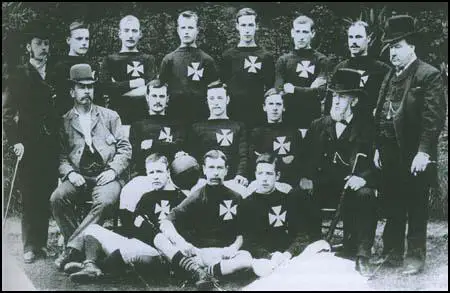
That winter Anna Connell established the St. Marks Church football team. In 1884 the team was renamed the Gorton Association Football Club. The team included three players, Walter Chew, William Beastow and Edward Kitchen, who had been members of the original cricket team. Beastow also supplied a new kit of black shirts with a white cross.
In August 1887 the club moved to a new ground at Hyde Road. They also changed their name to Ardwick. Two years later the club built a grandstand capable of holding 1,000 spectators.
On 2nd March, 1888, William McGregorcirculated a letter to Aston Villa, Blackburn Rovers, Bolton Wanderers, Preston North End, and West Bromwich Albion suggesting that "ten or twelve of the most prominent clubs in England combine to arrange home and away fixtures each season."
John J. Bentley of Bolton Wanderers and Tom Mitchell of Blackburn Rovers responded very positively to the suggestion. They suggested that other clubs should be invited to the meeting being held on 23rd March, 1888. This included Accrington, Burnley, Derby County, Notts County, Stoke, Wolverhampton Wanderers, Old Carthusians, and Everton should be invited to the meeting.
The following month the Football League was formed. It consisted of six clubs from Lancashire (Preston North End, Accrington, Blackburn Rovers, Burnley, Bolton Wanderers and Everton) and six from the Midlands (Aston Villa, Derby County, Notts County, Stoke, West Bromwich Albion and Wolverhampton Wanderers). The main reason Sunderland was excluded was because the other clubs in the league objected to the costs of travelling to the North-East. McGregor also wanted to restrict the league to twelve clubs. Therefore, the applications of Sheffield Wednesday, Nottingham Forest, Darwen and Bootle were rejected.
Ardwick was keen to join but first they had to build up their reputation as a football club. The joined the Alliance League and in 1891 Ardwick won the Manchester Cup. The following season they won the cup again by beating Football League side Bolton Wanderers, 4-1 in the final.
The management committee of the Football League decided in April 1892 to form a Second Division of 12 clubs as well as expanding the First Division to 16 teams. Ardwick became a member of the Second Division and in the 1892-93 season finished in 5th place.
Joshua Parlby became the Ardwick manager in 1893. The following year Newton Heath joined the Second Division. Both clubs were based in Manchester but neither carried the name of England's second largest city. Parlby argued that the club should change its name from Ardwick to Manchester City. As Gary James points out in Manchester City: The Complete Record (2006): "The selection of the name was directly aimed at creating a side to represent all of Manchester and so, for perhaps the first time in the history of the region, there was an organisation to represent all Mancunians no matter what their social status, background, or place of birth." The management committee agreed and the club became known as Manchester City.
In 1894 Joshua Parlby signed Billy Meredith from Northwich Victoria. Aged only nineteen, this extremely talented outside right soon became a firm favourite with the fans and was dubbed the "Welsh Wizard" by his admirers. The following year he won his first international cap for Wales. However, he continued to work underground as a miner during the week until 1896, when Manchester City finally insisted that he give up his colliery job. That season he was top scorer with 12 goals. He got another 12 in the 1897-98 season and helped Manchester City finish in 3rd place in the league.
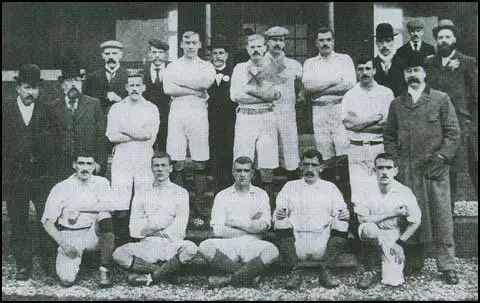
In the 1898-99 season Billy Meredith helped Manchester City win promotion to the First Division of the Football League. He scored four hat-tricks and ended up the season with 29 goals. Billy Gillespie was also prolific that season and added 17 to the 18 he scored the previous season. Manchester City did not find it easy in its first season in the top division and finished in eighth place.
In April 1900, Sam Ormerod managed to persuade Newton Heath to sell their star striker, Joe Cassidy for £250. The club directors admitted that he was the best forward they had ever had but because of Newton Heath's serious financial problems he had to be sold. During his time at the club he scored 100 goals in 174 appearances. In the 1890-91 season Cassidy was top scorer with 14 goals but he was sold to Middlesbrough in April 1901 for £75 on the grounds he was not worth his £4 a week wages. The manager, Ormerod, complained about this decision but it was now clear that the directors of the club had lost confidence in him and he was no longer making the key decisions.
Newton Heath, the other main team in Manchester, continued to have financial problems. In 1901 the club staged a four-day grand bazaar in St James Hall, Oxford Street, Manchester. The club needed to raise £1,000 in order to avoid bankruptcy. Even though Manchester City even made a donation, by the end of the third day it seemed that the venture would prove unsuccessful.
Harry Stafford had the idea of using his St. Bernard dog, Major, to raise money. He wandered amiably between the stalls with a collection box strapped to his back. It was hoped that the dog would attract donations. On the fourth day of the grand bazaar Major escaped from St. James Hall. He eventually found his way to the home of a rich businessman, John Henry Davies, who owned a successful brewery in Manchester. Davies liked the animal and decided to buy the dog for his daughter. When he traced the dog's owner, Stafford told Davies about the financial position of Newton Heath. The two men became friends and decided to make a takeover bid for the club.
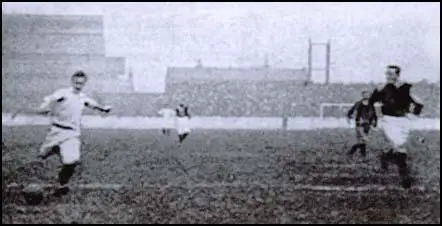
By 1902 Newton Heath was £2,670 in debt and faced a winding-up order. At a shareholders' meeting in the New Islington Hall, Harry Stafford announced that he and four local businessmen, including John Henry Davies, were willing to takeover the club's debts. The Football League approved the plan and Newton Heath now became Manchester United.
In the 1901-02 season Manchester City was relegated. Sam Ormerod resigned and was replaced by Tom Maley, the former Preston North End player. In a pre-season public practice game, Di Jones, who played with Billy Meredith in the Welsh national team, gashed his knee. Despite treatment from the club doctor, within a week the wound had turned septic and the player died.
Tom Maley decided to build a team around his star players, Billy Gillespie and Billy Meredith. This included players such as Herbert Burgess, Sandy Turnbull, Frank Booth and Jimmy Bannister. That season Manchester City won the Second Division championship by scoring 95 goals in 34 games. The top marksmen were Gillespie (30), Meredith (23), Turnbull (12) and Bannister (12).
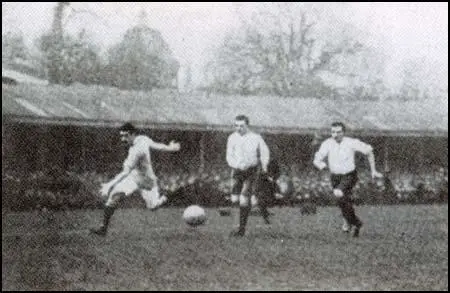
In the 1903-04 season Manchester City finished in second place in the First Division. They also had a good FA Cup run defeating Sunderland (3-2), Arsenal (2-0), Middlesbrough (3-1) and Sheffield Wednesday (3-0). Manchester City played Bolton Wanderers in the final at Crystal Palace. The only goal of the game was scored by Billy Meredith.
The Football Association was amazed by Manchester City's rapid improvement and that summer they decided to carry out an investigation into the way the club was being run. However, the officials only discovered some minor irregularities and no case was brought against the club.
The following season Manchester City again challenged for the championship. City needed to beat Aston Villa on the final day of the season. Sandy Turnbull gave Alec Leake, the Villa captain, a torrid time during the game. Leake threw some mud at him and he responded with a two-fingered gesture. Leake then punched Turnbull. According to some journalists, at the end of the game, Turnbull was dragged into the Villa dressing-room and beaten-up. Villa won the game 3-1 and Manchester City finished third, two points behind Newcastle United.
After the game Alec Leake claimed that Billy Meredith had offered him £10 to throw the game. Meredith was found guilty of this offence by the Football Association and was fined and suspended from playing football for a year. Manchester City refused to provide financial help for Meredith and so he decided to go public about what really was going on at the club: "What was the secret of the success of the Manchester City team? In my opinion, the fact that the club put aside the rule that no player should receive more than four pounds a week... The team delivered the goods, the club paid for the goods delivered and both sides were satisfied."
The Football Association was now forced to carry out another investigation into the financial activities of Manchester City. Tom Maley was interviewed and he admitted that he had followed what seemed like standard English practice by making additional payments to all their players. He claimed that if all First Division clubs were investigated, not four would come out "scatheless".
As a result of their investigation, the Football Association suspended Tom Maley from football for life. Seventeen players were fined and suspended until January 1907. Billy Gillespie refused to pay his fine and instead emigrated to the United States.
As Gary James pointed out in Manchester City: The Complete Record: "Basically, the entire squad that had finished as FA Cup-winners in 1904 and narrowly missed out on the Championship two years running were banned. This brought a premature end to City's first golden age."
Journalists were aware that virtually every club in the Football League was making illegal payments to its players. Football writers based in Manchester argued that the club, being a northern side, were being made an example of, and thousands of people complained to the Football Association, but it refused to reduce the bans and fines.
Manchester City was forced to sell their players in order to raise the money to pay the fines. At an auction at the Queen's Hotel in Manchester, the Manchester United manager, Ernest Mangnal signed Billy Meredith for only £500. While at City he scored 145 goals in 338 games. Mangnal also purchased three other talented members of the City side, Herbert Burgess, Sandy Turnbull and Jimmy Bannister. In 1906 John Henry Davies, the chairman of Manchester United, provided the funds for Meredith to set up a sports-equipment shop in St Peter's Square, Manchester.
Harry Newbould was appointed as the new manager in July 1906. As a result of the bans and transfers, there were only 11 players available. The first two games in the 1906-07 season resulted in to heavy defeats at the hands of Arsenal (4-1) and Everton (9-1). Manchester City finished 4th from bottom that season. Irvine Thornley ended up as the club's top scorer with 13 goals in 29 games. Billy Jones was second in the list with 11 goals in 27 games.
Manchester City finished in 3rd place in the 1907-08 season. However, Manchester United, a team that included City's former stars, Billy Meredith, Herbert Burgess, Sandy Turnbull and Jimmy Bannister won the league championship. Once again Irvine Thornley was the club's top scorer with 14 goals in 31 games.
Thorney was in great form in the 1908-09 season and scored another 18 goals. However, the rest of the team played badly and Manchester City finished second from bottom and were relegated.
In 1909 Irvine Thornley was appointed club captain. He responded well to this new responsibility and scored 12 goals in the opening 17 games. He was then seriously injured and missed the rest of the season. Thornley had built the foundations for a good campaign and by beating Leeds United 3-0 on 23rd September, 1910, they guaranteed promotion to the First Division. Hull City could still deny them the championship but they lost their final game and City took the title by one point.
In August 1912, Ernest Mangnall decided to move from Manchester United to Manchester City. During his nine years at the club, Mangnal had completely transformed the fortunes of the club. He was replaced by John J. Bentley, the former president of the Football League.
Manchester City had a good start to the 1912-13 season and won every game in September. The Daily Dispatch reported that it was "nine years have passed since Manchester City commenced a campaign in this stimulating style." However, City could not maintain this pace and by the end of the season they finished 6th, two points behind Manchester United. City finished 15th in 1913-14 and 5th in 1914-15.
The Football League resumed after the First World War in the 1919-20 season. Mangnall made the surprising decision to buy the 46 year old Billy Meredith from Manchester United. That year City finished in 7th place. Mangnall did even better in the 1920-21 season with only Burnley achieving more league points.
In 1923 Ernest Mangnall arranged for Manchester City to move to Maine Road. It was popular with the fans and over 76,000 people watched City play Cardiff in the 4th Round of the FA Cup. City won the game but was defeated by Newcastle United in the semi-final. At the end of the season it was decided not to renew Mangnall's contract.
David Ashworth now became manager of the club. His first important signing was Sam Cowan who joined Manchester City in December 1924. Cowan helped Manchester City to reach the 1926 FA Cup Final.
In 1928 Eric Brook and his friend Fred Tilson, both joined Manchester City from Barnsley. A 19 year old Matt Busby also joined from Scotland. That season the club won the Second Division championship. The following season the club signed Ernie Toseland.
Manchester City finished in 3rd place in the 1929-30 season. Sam Cowan had an outstanding season. Teammate Matt Busby once said that Cowan "could head a ball as far as most of us could kick it. This form was not continued and the club finished 8th in 1930-31 and 14th in 1931-32.
Wilf Wild became the manager of Manchester City on 14th March 1932. That season the club could only finish 14th in the league. However, they enjoyed a good FA Cup run. Fred Tilson scored a hat-trick in City's 9-0 victory over Gateshead. Eric Brook scored both goals against Walsall (2-0) and a hat-trick against Bolton Wanderers (4-2). Tilson scored against Burnley (1-0) and Derby County (3-2) and Manchester City had reached the final at Wembley. The Everton team that day included players such as Dixie Dean, Cliff Britton, Ted Sager and Albert Geldard. With Tilson missing because of injury, City lost the game 3-0.
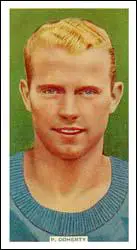
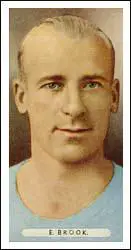
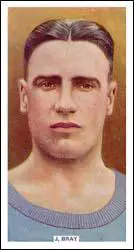
In the 1933-34 season Manchester City finished 5th in the First Division of the Football League. The top four goal scorers that year were Alec Herd (17), Fred Tilson (12), Eric Brook (8) and Ernie Toseland (6).
The club also enjoyed a good FA Cup run beating Blackburn Rovers (3-1), Hull City (4-1), Sheffield Wednesday (2-0), Stoke City (1-0), Aston Villa (6-1) to reach the final against Portsmouth. On the way to Wembley the goals had been scored by Fred Tilson (7), Alec Herd (4), Ernie Toseland (4) and Eric Brook (3). The defence, that included players such as Frank Swift, Billy Dale, Sam Cowan, Jackie Bray and Matt Busby, also performed well.
Manchester City played Portsmouth in the final at Wembley. Fred Tilson had such a terrible injury record that when Sam Cowan introduced him to George VI before the game, he said: "This is Tilson, your Majesty. He's playing today with two broken legs." It was a good job that Tilson did play as he scored both of the goals in the 2-1 victory to increase his total to nine in eight cup games that season. Frank Swift, City's young goalkeeper, was so overcome by the achievement that he fainted at the final whistle.
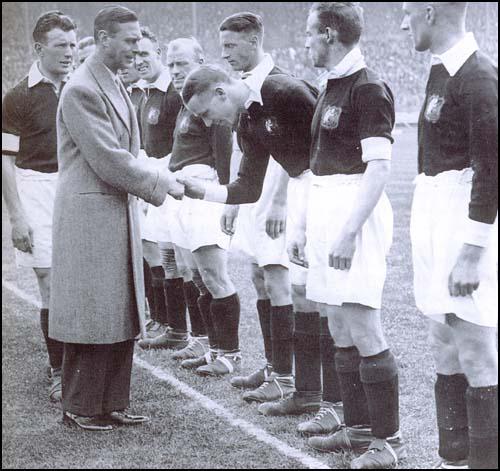
In April 1934 Wilf Wild signed Sam Barkas from Bradford City for a fee of £5,000. A stylish full-back, Barkas had the ability to "create positive-play from defensive positions". He joined a team that included Frank Swift, Billy Dale, Sam Cowan, Jimmy McMullan, Jackie Bray, Matt Busby, Fred Tilson, Alec Herd, Ernie Toseland and Eric Brook.
Jimmy Heale played with Matt Busby that season. He later recalled: "It's well known that Matt played at right-half for City, but really his strongest foot was his left. His top move was to get past a few players moving towards the centre of the field, then switch it by hitting a ball over to the corner flag where Ernie Toseland would already be into his stride. That created lots of goal chances. Matt was, I suppose, what you call a schemer these days".
As Stanley Matthews once pointed out: "One of Matt's greatest strengths as a player was his passing. Not only could he split open defences but the pass was always so beautifully timed and weighted it was perfect for City forwards such as Eric Brook, Freddie Tilson or Alex Herd to latch on to without breaking their stride. For all players were tightly marked in the thirties, Matt could overcome all that with one sweeping pass. I think his ability to pick out team-mates with superlative passing was indicative of his great vision even then.
Tommy Lawton agreed that Matt Busby was a great passer of the ball: "Surely football has never seen such an immaculate passer of the ball than the cheerful, likeable Scot. It was uncanny to see him change the direction of a game with one shrewd pass, which always went speedily and accurately to the right man. There was never anything slipshod about Matt. Only the best would do and no matter where the ball was he was always working, always taking up position, always thinking a couple of moves ahead of anyone else. So no wonder Matt Busby covered more ground in each match than any other player on the field, and to what wonderful purpose!"
Wilf Wild surprisingly decided to sell Matt Busby to Liverpool in March 1936. He also transferred Sam Cowan to Bradford City. However, with the emergence of players such as Eric Brook, Alec Herd, Fred Tilson, Ernie Toseland, Frank Swift, Jackie Bray, Billy Dale and Sam Barkas, City was now seen as the club most likely to challenge the dominance of the Arsenal side that had won the league titles in the 1932-33, 1933-34 and 1934-35 seasons.
A record crowd of 79,491 watched the Manchester City game against Arsenal at Maine Road on 23rd February 1935. Eric Brook scored City's goal in the 1-1 draw. However, it was a disappointing season as City could only finish in 9th place in the league.
In February 1936 Wilf Wild purchased Peter Doherty from Blackpool, for a club record fee of £10,000. He joined a forward-line that included Eric Brook, Alec Herd, Fred Tilson and Ernie Toseland.
By the end of 1936 Manchester City had obtained 23 points out of a possible 44. As Gary James points out in Manchester City: The Complete Record: "It was still not Championship form, but enough to give them a foundation to build on. The New Year saw City climb up the table and, by the time of their meeting with the usual dominant Arsenal in April 1937, the two sides occupied the top two positions." A crowd of 74,918 watched Peter Doherty and Ernie Toseland score the goals that gave City a 2-0 victory.
Over the next three weeks Manchester City went on to beat Sunderland (3-1), Preston North End (5-2) and Sheffield Wednesday (4-1). City could only draw their last game 2-2 but by this time had been crowned champions. City scored 107 goals in the 1936-37 season, the main contributors being Peter Doherty (30), Eric Brook (20), Alec Herd (17), Fred Tilson (15) and Ernie Toseland (7). The defence, that included Frank Swift, Jackie Bray, Billy Dale and Sam Barkas, also did well that season, only letting in 61 goals in 42 games.
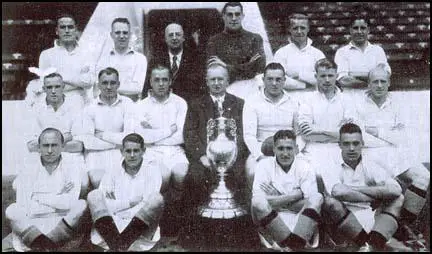
It was the first time that Manchester City had won the First Division league title. The club celebrated by going on a tour of Nazi Germany. Over 70,000 turned up to the Berlin Olympic Stadium to watch City play a team made up of Germany's best players. Adolf Hitler wanted to make use of this game as propaganda for his Nazi government and the City players were asked to to give the raised arm Nazi salute during the playing of the German national anthem. Peter Doherty later recalled: "We were expected to give the Nazi salute at the line-up before the match started; but we decided merely to stand to attention. When the German national anthem was played, only 11 arms went up instead of the expected 22!" City lost the game 3-2 after a uncharacteristic mistake by Frank Swift.
In the 1937-38 season Manchester City once again scored more goals than any other club in the First Division. Once again Peter Doherty (23), Eric Brook (16) and Alec Herd (12) were the leading scorers. However the defence, performed badly letting in 77 goals. The club finished in 21st position and was relegated to the Second Division.
Primary Sources
(1) Mike Rowbottom, The Independent (25th October, 2007)
Photographs of many faces stare down at Peter Lupson as he works in the study of his home near the Wirral. Some are of his family. Others belong to people long dead who have nevertheless loomed large in his life as he has spent the last 11 years writing a book which offers English football an opportunity to examine its soul.
These grainy black-and-white reproductions of Victorian visages are nothing less than a gallery of the game's founding fathers, to whom Lupson's recently published Thank God for Football (Azure, £9.99) pays painstaking tribute. In researching his work, this 61-year-old languages teacher has established that 12 of the 38 clubs which have played in the Premier League can trace their origin directly back to churches or chapels. He has also traced the lives of those responsible for starting the teams, in the case of six of them, all the way to their graves, which he has located in various stages of disrepair. Last month, Tottenham Hotspur, having been alerted to the fact that their originator, John Ripsher, lay in a pauper's grave in Dover, became the first of those six clubs to honour their beginnings, setting up a smart new headstone which acknowledges the role played by this former bible class teacher from All Hallows Church. Other clubs mobilising to spruce up their founders' resting places include Blackburn Rovers, Bolton Wanderers, Manchester City and Swindon Town, while Everton have just been alerted to the current whereabouts of Benjamin Swift Chambers, responsible for their creation as St Domingo FC. Honouring graves is one thing; honouring ideals another. It is Lupson's fond hope, nevertheless, that these acts of piety may yet prompt football's influential figures to reconsider some of the principles which inspired the graves' inhabitants. The teams in question were instituted in the spirit of "muscular Christianity", a concept that was developed in the latter half of the nineteenth century which emphasised the importance of serving others and striving in a physical sense as part of the Christian's duty. Fostered in public schools, and popularised in Thomas Hughes' 1857 book Tom Brown's Schooldays, this ideal was instilled in a generation of young clergymen who emerged from universities and took up positions in urban communities where working men were in danger of being lost in a mire of poverty, drunkenness and gang violence. In Tottenham, in Fulham, in Southampton, in Swindon, in Everton, in Bolton, in Manchester it was time to "play up and play the game". "There were four key ingredients of character which it was believed the games field could develop," Lupson says. "Courage – which they called 'pluck', not ducking the hard challenge – fair play, unselfishness – you played for the team – and self-control. So football was seen very early on as a moral agent." Thus, when a new rector arrived at St Mark's, in West Gorton, Manchester, in 1879, he encouraged his 27-year-old daughter, Anna Connell, to take on her own hard challenge. "At that time, West Gorton was an area of tremendous deprivation," Lupson says. "There was overcrowding, squalor, poor sanitation and poverty, and the ways in which the men of the community sought refuge from this was drink and gang warfare, which was called 'scuttling' in that era. "We are talking about 500 people at a time involved in fighting. The local press reported 250-a-side – we are talking about warfare. Anna was grieved by seeing these men live such wasted lives and wanted to do something for them that could reverse the direction they were going in." Miss Connell knocked on every door in the parish – by Lupson's estimation, that meant 1000 doors – to spread word of the weekly working men's club she was setting up in the parish hall. The first week, three people turned up. But soon, with the help of two churchwardens who worked at the local ironworks, that number became 100. Playing sport was a natural adjunct to other activities such as singing, discussion and bible recitations. That meant, in the first instance, cricket. But soon the men wanted to keep fit in the winter for their cricket, and decided to do so through football. "They called themselves St Mark's West Gorton FC," Lupson says. " Anna's father, Arthur, was the first president, and that club exists today because of Anna Connell knocking on all those doors and not giving up, and it's called Manchester City."
(2) Gary James, Manchester City: The Complete Record (2006)
The selection of the name was directly aimed at creating a side to represent all of Manchester and so, for perhaps the first time in the history of the region, there was an organisation to represent all Mancunians no matter what their social status, background, or place of birth.
(3) John Harding, For the Good of the Game (1991)
When First Division status - painfully earned on a shoestring budget - was briefly lost in 1901, wholesale changes occurred at Hyde Road, Manchester City's original home. Backed by newspaper millionaire Edward Hulton's money, Scotsman Tom Maley rapidly bought and built a successful new side that swept back into the First Division and took the FA Cup to Manchester for the first time the following year...The following season, however, City's strong challenge for the League title ended disappointingly: needing to beat Aston Villa in their last match (in the hope that Newcastle might drop a point at lowly Middlesborough), City tried hard but lost 3-2. The match was marred by fighting among the players both during and after the game and, following as it did some ugly incidents in an earlier City versus Everton match, the FA felt obliged to investigate.The subsequent enquiry revealed startling and totally unexpected evidence of attempted bribery involving of Meredith and, despite his protestations of innocence, he was suspended for a year, banned from City's ground and fined.More sensations were to follow as Meredith, angered by the attitude of Manchester's City's officials, pestered the club for financial recompense. This led to yet more official investigations with Meredith ultimately turning 'King's Evidence', admitting illegal payments and thus bringing down the whole house of cards City had so carefully constructed.
So outraged was the FA by what had been uncovered that it virtually dismembered the club: the complete Cup-winning side of 1903 was suspended and banned from ever playing for City again; directors (including josh Parlby, one of the original Football League founder members) were banned for life and the club was fined to within an inch of survival.
Meredith, along with other key City players, was subsequently snapped up by Manchester United, a club with just as much ambition as City but with a rather more far-sighted management. Within two years United were League champions, the following year they took the Cup and in 1910 the whole organization moved from east to west across the city to spacious Old Trafford, to a stadium built for the twentieth century and a fitting stage for its talented, attractive team.
(4) Stanley Matthews , The Way It Was (2000)
Matt Busby joined Manchester City from the small Scottish club Denny Hibernians in 1928, originally as an inside-right, but his career blossomed when City switched him to right-half. He never had a crunching tackle, but so precise was his timing that he stole the ball off your toe. For all he was a resolute defender, he loved to get forward; in many respects he was what we would term today an attacking midfielder. Matt won an FA Cup winners medal in 1934 when Manchester City beat Portsmouth 2-1 in the final. City's teenage goalkeeper Frank Swift was so overcome with emotion he collapsed and had to be carried to the Royal Box to receive his medal. Matt moved on from City to Liverpool in 1936 for what was then a considerable fee of £8,000 and stayed at Anfield until war broke out in 1939 when, like just about every other player of the day, he joined the services. Matt did turn out for Liverpool in unofficial matches during the war years and guested for a number of clubs situated near to wherever he was stationed, but effectively his playing career ended in 1939.
One of Matt's greatest strengths as a player was his passing. Not only could he split open defences but the pass was always so beautifully timed and weighted it was perfect for City forwards such as Eric Brook, Freddie Tilson or Alex Herd to latch on to without breaking their stride. For all players were tightly marked in the thirties, Matt could overcome all that with one sweeping pass. I think his ability to pick out team-mates with superlative passing was indicative of his great vision even then.
(5) Tommy Lawton , My Twenty Years of Soccer (1955)
Probably the classiest wing half back I have ever met was Matt Busby, and I am not surprised he has made such a success of his job as manager of Manchester United, for Matt was not only a great player, he was also a great teacher.
Surely football has never seen such an immaculate passer of the ball than the cheerful, likeable Scot. It was uncanny to see him change the direction of a game with one shrewd pass, which always went speedily and accurately to the right man.
There was never anything slipshod about Matt. Only the best would do and no matter where the ball was he was always working, always taking up position, always thinking a couple of moves ahead of anyone else. So no wonder Matt Busby covered more ground in each match than any other player on the field, and to what wonderful purpose!
(6) Jimmy Heale played with Matt Busby at Manchester City. He was interviewed by Rick Glanvill for his book Sir Matt Busby: A Tribute.
It's well known that Matt played at right-half for City, but really his strongest foot was his left. His top move was to get past a few players moving towards the centre of the field, then switch it by hitting a ball over to the corner flag where Ernie Toseland would already be into his stride. That created lots of goal chances. Matt was, I suppose, what you call a "schemer" these days. He was such a good player and yet he only earned himself one cap before wartime. We often used to joke about how good that other fellow must have been to keep him out of the Scottish team. Matt was a great example to the younger lads. But like one or two other of the lads, he'd sneak off to the toilets for a Woodbine on occasion. Having said that I can rarely recall him swearing and he was a clean-living chap on and off the field. He was a great example to the younger players.
